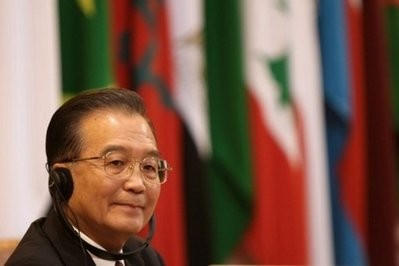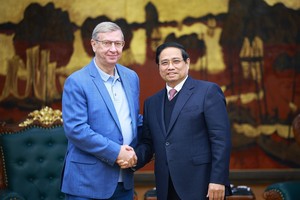BEIJING (AFP) – The United States is to blame for recent tensions in Sino-US ties and must take steps to repair the damage, Chinese Premier Wen Jiabao said Sunday, indicating no let-up in their diplomatic row.
Wen accused Washington of violating China's sovereignty when it approved the sale of billions of dollars in weapons to Taiwan in January, and again when US President Barack Obama met the Dalai Lama at the White House last month.

Relations between the two countries have deteriorated over a series of other issues -- Google's threat to leave China over cyberattacks and web censorship, a string of trade disputes, and the value of the Chinese yuan.
Wen, addressing hundreds of reporters at the end of China's annual session of parliament, said relations between the world's biggest and third-largest economies "got off to a good start" after Obama took office in January 2009.
But Washington's moves on self-ruled Taiwan, which China sees as part of its territory, and Obama's meeting with Tibet's exiled spiritual leader had "violated China's sovereignty" and provoked "serious disturbances" in ties.
"The responsibility does not lie with the Chinese side but with the US," Wen said.
"We hope the US will face the issues squarely and take concrete steps" to remedy the situation, he added, while declining to offer specifics.
"A peaceful US-China relationship makes both countries winners," Wen told reporters.
"It's better to have dialogue rather than confrontation, cooperation rather than containment and partnership rather than rivalry."
Washington in January approved the sale of 6.4 billion dollars in arms to self-ruled Taiwan, which China sees as part of its territory awaiting reunification, by force if necessary.
Last month, Obama met the Dalai Lama, Tibet's exiled spiritual leader, at the White House. Beijing says the Buddhist monk is bent on independence for the Himalayan region, a charge he denies.
On the yuan, Wen warned foreign countries it would resist outside pressure, after Obama last week called on Beijing to adopt a "market-oriented" policy on the currency, which has been effectively pegged to the dollar since mid-2008.
"We are opposed to the practice of engaging in mutual finger-pointing among countries or taking strong measures to force other countries to appreciate their currencies," Wen said.
Washington has led calls for a stronger yuan, saying the currency is kept intentionally low to boost Chinese exports.
Asked about the flap surrounding Google, Wen tip-toed around the question, repeating only that China was open to foreign companies wishing to set up shop in the Asian giant.
"China will unswervingly pursue the policy of opening up to the outside world. Foreign businesses are welcome to come to China to establish businesses... according to the law," the premier said.
Wen said foreign businesses would enjoy the same treatment as local companies and expressed the hope that they would build more research and development centres.
Google threatened in January to abandon its Chinese-language search engine and perhaps leave China altogether over what it said were cyberattacks aimed at its source code and at the Gmail accounts of Chinese human rights activists.
The US Internet giant -- which says it is in talks with the Chinese government about its future in the country -- has also said it is no longer willing to bow to Chinese government censors by filtering its search results.
China's minister of industry and information technology, Li Yizhong, warned Google last week that it would face "consequences" if it were to violate Chinese law by ending its filters, saying such a move would be "irresponsible".
The Financial Times reported at the weekend that Google was "99.9 percent" certain to move forward with plans to abandon google.cn, citing an unnamed source with knowledge of the company's position.
























